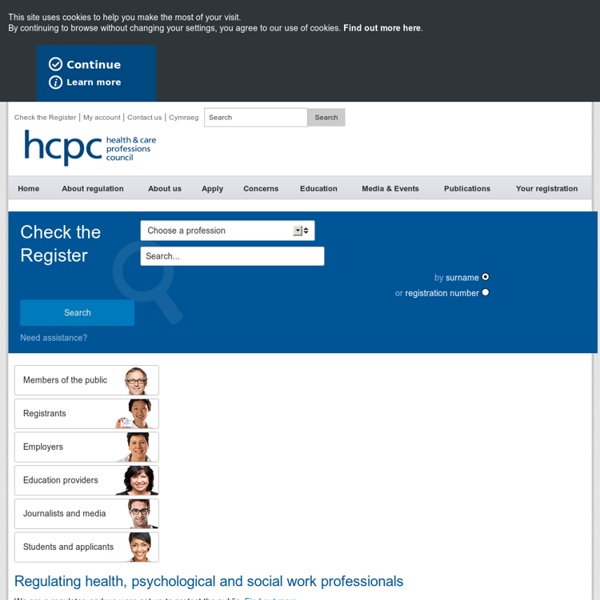



Stuff that occurs to me: Where London science communicators might work by @JoBrodie, brodiesnotes.blogspot.com Updated 28 December 2013 - sections marked in orange have been checked, others haven't. Shortened link for this post is How you can help... Speech and language therapist: Job description Speech and language therapists (SLTs) work closely with babies, children and adults who have various levels of speech, language and communication problems, and with those who have swallowing, drinking or eating difficulties. The role can involve working with a diverse client group, including people with physical and learning disabilities, hearing loss/deafness, psychiatric disorders or dementia. Therapists assess a client's needs before developing individual treatment programmes to enable each client to improve as much as possible. Treatment plans often involve other people with whom the client has a close relationship, for example family, carers or teachers. SLTs usually work as part of a multidisciplinary team, alongside other health professionals such as:
Biomedical scientist: Job description Biomedical scientists work in healthcare and carry out a range of laboratory tests and techniques on tissue samples and fluids to help clinicians diagnose diseases. They also evaluate the effectiveness of treatments. Their work is extremely important for many hospital departments and the functions they carry out are wide ranging. For example, they may work on medical conditions, such as cancer, diabetes, AIDS, malaria, food poisoning or anaemia, or carry out tests for emergency blood transfusions or to see if someone has had a heart attack. Biomedical scientists can work in three areas: infection sciences; blood sciences; and cellular sciences. Infection sciences include:
University Of Reading - Biopharma Skills Consortium Industrial placements range from being a core element of the educational programme to those where it is the student’s responsibility to get relevant industrial experience, identify opportunities and evaluate their learning. However, in all cases, placement preparation tends to focus more on identifying opportunities, making applications, health and safety and contractual issues and less on researching and reflecting on what it is like to work in industry. ECIF-funded internship projects within the institutions of the Biopharma Skills Consortium (BSC) indicate that increasing students’ understanding of the industrial–commercial environment can help them to move more effectively to the workplace and be more productive at an earlier stage. The training resources in this section of the website were designed to address this recognised skills gap. We are grateful to the National HE STEM programme for providing the BSC with funding to develop these resources. Aims of the training resources
Speech and language therapist: job description Speech and language therapists diagnose, advise about and treat speech and language problems, to help people to communicate effectively. What does a speech therapist do? Typical employers | Qualifications and training | Key skills Therapists work in health centres, hospitals, clinics, schools, independent practices and patients' homes with adults and children whose symptoms are the results of illness, accident, disability, acquired disorders or congenital/emotional problems. Typical responsibilities of the job include: undertaking patient assessments planning and providing appropriate treatment giving advice and support to patients, family members and teachers writing reports maintaining records and case notes liaising with doctors, physiotherapists, teachers and family members and carers and performing controlled therapy sessions with individuals, groups and/or families
Biomedical scientist Job Information Page Content Biomedical scientist Hours37.5 per weekStarting salary£21,692 + per year Biomedical scientists test samples from patients to support doctors and healthcare professionals in the diagnosis and treatment of disease. NHS Scientist Training Programme The NHS Scientist Training Programme (STP) may be for you if you are a science or engineering graduate. You can train to work in a senior healthcare science role in one of the following areas: The programme You'll be employed on a fixed-term contract and paid a salary during your training.
Speech and language therapist Job Information Page Content Speech and language therapist Hours37.5 per weekStarting salary£21,692 + per year Biomedical scientist: job description Biomedical scientists carry out experiments on samples of body fluids and tissue to help develop solutions to threatening diseases. What does a biomedical scientist do? Typical employers | Qualifications and training | Key skills Life Science Jobs Ref:: 92 JAVA Developer South East, United Kingdom Salary: £45ph - £50ph Job type: Interim/Contract Posted: 04/08/2015 Currently I have a brilliant opportunity working with a biopharmaceutical company based in south England who is currently looking for a JAVA Developer to join their SDF team this role will incorporate some cross over in to more of a technical programming role as well but maintain ... Ref:: 105 Quality Compliance Officer South Yorkshire, United Kingdom Salary: £35k Job type: Permanent Posted: 25/08/2015 This is a fantastic opportunity with a world leader in the medical devices industry, employing around 20000 people globally. Currently looking for experts win Quality Assurance and Compliance, this role is an initial 12 month fixed-term position with the view to make permanent af ...
Work experience This is a very common question and the RCSLT’s advice is to contact your local speech and language therapy service as they may be able to arrange an observation session. However, you may find this difficult to arrange – and the universities do recognise this issue. Course admissions tutors will look at your understanding of the profession and the needs of people with communications disorders, and also your ability to communicate with them, rather than whether you've simply observed therapists at work. This means that any reading you have done, voluntary work and other relevant work experience are all regarded as relevant. Observation sessions are therefore not a necessity if you employ other methods.